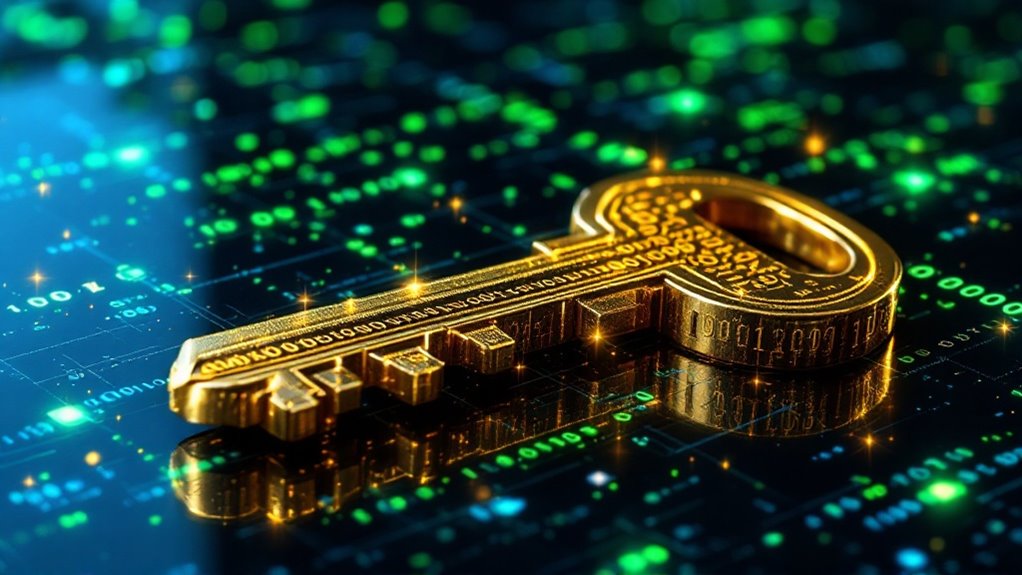Private keys function as digital master keys, granting exclusive access to cryptocurrency wallets, encrypted messages, and blockchain transactions. These unique alphanumeric codes, typically 256 digits long, work alongside public keys but must remain strictly confidential. Unlike traditional banking passwords that can be reset, lost private keys mean permanent separation from digital assets. While they offer unprecedented control over digital wealth, their management requires careful consideration. The journey into private key security reveals both liberation and responsibility.

Private keys, the unsung guardians of our digital world, serve as the cryptographic equivalent of a master key that opens the most precious virtual vaults. These alphanumeric strings, typically stretching 256 digits long, hold the power to access encrypted messages, authorize transactions, and prove ownership of digital assets. Like ancient scrolls containing powerful spells, they must be guarded with unwavering vigilance, for their loss or theft can spell digital doom. Digital signatures provide cryptographic proof of authenticity and integrity for secure document signing.
Private keys stand as silent sentinels, protecting our digital fortunes with mathematical precision and unforgiving permanence.
In the domain of cryptocurrency and blockchain technology, private keys act as the invisible thread connecting users to their digital wealth. They dance in mathematical harmony with their public key counterparts, creating a secure choreography that enables everything from simple bitcoin transfers to complex smart contract executions. While public keys can be shared freely like business cards at a networking event, private keys remain tucked away in secure digital wallets or, for the particularly cautious, etched onto offline storage devices. Modern organizations often employ hardware security modules to provide the highest level of protection for these critical keys. For enhanced security, some users implement secret sharing techniques to split their keys into multiple parts.
The generation of these cryptographic marvels involves sophisticated algorithms that would make even the most seasoned mathematicians scratch their heads. Yet, their practical application has become surprisingly accessible, thanks to user-friendly wallet software that can create them with a simple click. Some systems even transform these complex strings into memorable phrases, turning abstract numbers into poetic sequences of words that feel more like ancient mantras than cutting-edge technology.
However, the power of private keys comes with weighty responsibilities. They represent a double-edged sword in our quest for digital autonomy – offering unprecedented control over our digital assets while simultaneously creating a single point of vulnerability. Unlike traditional banking systems where forgotten passwords can be reset through customer service, lost private keys often mean permanent separation from one's digital treasures.
This unforgiving nature has led to countless tales of digital fortunes locked away forever, serving as stark reminders of the importance of proper key management practices in our increasingly cryptographic world.
Frequently Asked Questions
Can Private Keys Be Recovered if Forgotten or Lost?
Private keys cannot be recovered if forgotten or lost. Without the original key or recovery phrase, cryptocurrency funds become permanently inaccessible. Alternative recovery methods only work if proper backup procedures were previously implemented.
What Happens to Private Keys After a Hardware Wallet Breaks?
When a hardware wallet breaks, private keys remain on the blockchain and are accessible by using the recovery phrase to restore the wallet on a new device or compatible alternative wallet.
Is It Safe to Store Private Keys in Password Managers?
Storing private keys in password managers is relatively safe when using reputable providers with robust security measures. However, users should implement strong master passwords and enable two-factor authentication for ideal protection.
How Often Should I Change or Rotate My Private Keys?
Private keys should be rotated every 90 days as a baseline practice. High-risk scenarios may require monthly rotation, while some industries mandate 30-60 day cycles. Automated rotation can enable more frequent schedules.
Can Quantum Computers Break Current Private Key Encryption Methods?
Quantum computers can theoretically break widely-used RSA and ECC encryption through Shor's algorithm. However, current quantum computers lack sufficient qubits to pose an immediate threat to private key encryption methods.









